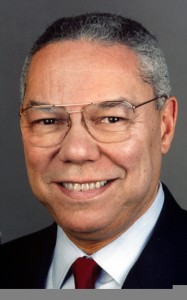by Jeff Fleischer
(Mother Jones, November 15, 2004)
Now that Colin Powell has confirmed one of the worst-kept secrets in Washington by announcing his resignation, those who’ve worked with and covered Powell during the past four years are looking at his legacy. And the man introduced upon his appointment by George Bush as “an American hero, an American example, and a great American story” now leaves office having simply lost too many battles within the administration.
The announcement of Powell’s resignation means at least six of George Bush’s 15 Cabinet secretaries will be departing, but Powell is the one drawing praise like this from top Democrats:
“Even after four difficult years in a bitterly divided administration, Colin Powell leaves the State Department with his head held high and an unmatched reputation for integrity and wisdom,” — Sen. Joe Biden (D-Del.)
“As a soldier and a statesman, Colin Powell provided exceptional leadership. His steady hand and the reasoned approach he brought to his work will be sorely missed.” — House Minority Leader Nancy Pelosi (D-Calif.)
“Secretary Powell’s departure is a loss to the moderate internationalist voices in the Bush administration. Hopefully, his replacement will be a pragmatist rather than an ideologue.” – Gov. Bill Richrdson (D-N.M.)
“Colin Powell commands tremendous respect on Capitol Hill; his successor will have quite a legacy to live up to.” — Rep. Tom Lantos (D-Calif.)
Such plaudits reinforce Powell’s ability to remain more popular than the policies he’s had to defend and, obviously, that reflects his moderation compared to the Rumsfelds and Wolfowitzes around him. But the administration proved adept at taking advantage of Powell’s combination of popularity and good-soldier loyalty, most prominently with the Feb. 5, 2003 address to the United Nations Security Council in which Powell laid out the paper-thin and misleading case for the Iraq war. As The American Prospect explains:
“No sooner did Powell speak than his aides let it be known — Powell and the people around him are masters of the well-timed leak — that prior to his UN appearance, the secretary of state had spent a number of hours at CIA headquarters sifting through the evidence he had been asked to present and had discarded reams of it, frustrated with the inadequate sourcing and selective use of intelligence. Among the discarded portions of the script: the now infamous allegation that Iraq had sought to purchase yellowcake uranium from Niger.”
But Powell still backed the administration’s decisions in public, consistently responding “I serve at the pleasure of the president” when asked about the president essentially making him a fall guy. As the Prospect notes, even the president’s move to give authority for postwar Iraq to Rumsfeld’s Defense Department (instead of State, where precedent would place it), couldn’t shake Powell’s support. And the very way the war was waged was something of a slap at Powell, as Agence France Press notes:
“Secretary of State Colin Powell’s chief military legacy is the view that the United States should commit troops to battle only when vital national interests are at stake and then with overwhelming force to achieve clearly defined objectives.
“Dubbed the ‘Powell Doctrine,’ Powell’s code on the use of force has been ignored during the administration of President George W. Bush which opted for speed over mass in invading Iraq last year, leaving US forces embroiled in a protracted guerrilla war.”
Like the aforementioned Democrats, world leaders spoke well of Powell’s service, and urged the administration to replace him with another voice of moderation:
“We really do hope that in President Bush’s second term every effort will be exacted in order to realize President Bush’s vision of a two-state solution on the ground,” Palestinian Cabinet Minister Saeb Erekat said. “In our deliberations with Secretary Powell, he gained our highest respects and appreciation through his fairness and in dealing in a very highly dignified manner.”
“It has been a joy to work with Colin Powell and over the last three and a half years I have come to know him better and better,” British Foreign Secretary Jack Straw said. “He has been in (his job) in perhaps the most difficult and fraught period in terms of the world situation that one can think of outside serious wartime, because of what happened on Sept. 11, 2001. Colin has great energy. He is a man of the utmost integrity. He is huge fun.”
Powell’s accomplishments as secretary of state shouldn’t be forgotten. He was the administration’s leading voice for engagement with North Korea, he was the first top U.S. official to label Sudan’s crisis a genocide, and his negotiations with Libya ended that country’s nuclear prospects. As Straw said:
“He has had a great many successes to his credit: the fact that there was an international consensus developed so swiftly in respect of Afghanistan; the fact that the US agreed to put the whole issue of Iraq back before the United Nations and that we were able to achieve resolution 1441 at the beginning of November 2002 was above all due to his indefatigable efforts in negotiating that resolution line by line.
“And then, perhaps above all, although the situation in the Middle East has been very frustrating, it was he who encouraged the US government to go down the path of the two-state solution. President Bush became the first US President ever to recognize that there has to be a separate, viable state of Palestine.”
In those instances, Powell was able to get things done unencumbered by the intra-administration conflict that helped create the debacle in Iraq. While he proved unable or unwilling to overcome those tensions or speak out publicly against the war, his resignation is worrying for one key reason: If Colin Powell couldn’t get Bush’s war Cabinet to listen to him, it’s unlikely any moderate voice could have done so.
Tags: colin powell, daily mojo, jeff fleischer, mother jones